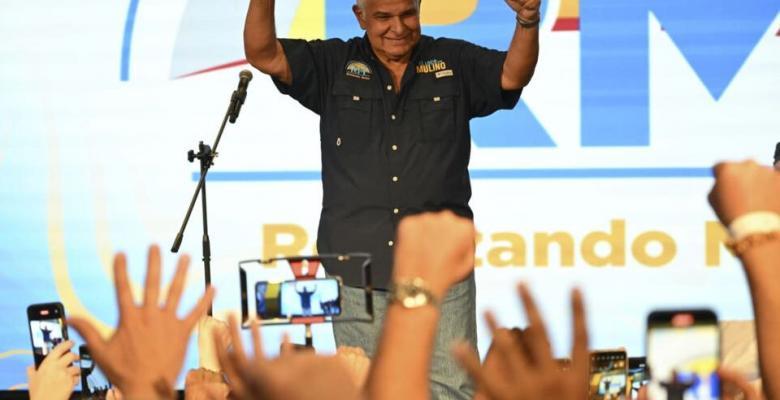Panamanian Presidential Eelections: Mulino Will Face Tense Situation
especiales

José Raúl Mulino emerged victorious in the presidential elections held last Sunday in Panama, where he will have to face serious problems in a polarized country and subject to a lot of political tension and uncertainty.
Mulino, from the right-wing Alliance to Save Panama, was elected among eight candidates in elections that only included a single round, considered one of the most important in recent years, mainly since 1989, when the United States military invasion.
With 90.96% of the tables counted, that is, 6,890 and with 684 left to count, the polls' forecast has been fulfilled and José Raúl Mulino wins by obtaining 34.45% of the votes, that is, 721,550, followed by Ricardo Lombana, who obtained 25%, that is, 523,543.
Former president Martín Torrijos remains in third position with 16.1% of the votes, followed by Rómulo Roux with 11.22%, Zulay Rodríguez with 8.24%, the ruling party Gabriel 'Gaby' Carrizo with 5, 76%, Maribel Gordón with 1.07%, and Melitón Arrocha with 0.21%.
The electoral roll of Panama is 3 million 4,083 voters, of which 2 million 770,267 went to the polls, for a total of 74.44% participation. Voting is mandatory.
Of the votes cast, 2 million 93,961 are valid, 16,683 were blank and 34,723 were null, this with data updated until 9:26 p.m.
PROFILE OF THE ELECTED PRESIDENT
64-year-old lawyer graduated from Universidad Santa María La Antigua with a degree in Law and Political Science, and a master's degree in Maritime Law from Tulane University.
From 1990 -1993 he was vice minister of Foreign Affairs; From 1993 -1994 he was minister of that government office. From 1994 -1995 he was a member of the National Council of Foreign Relations and Substitute Magistrate of the Civil Chamber of the Supreme Court of Justice (CSJ for its acronym in Spanish).
Mulino presided over the Panamanian Association of Business Executives (APEDE) and has been an honorary member of the National Council of Private Enterprise, whose vice-presidency he held from 1989 to 1990; he is part of the Panamanian Association of Maritime Law and the American Society of International Law.
He was also Minister of Public Security and Minister of Government and Justice, during the Martinelli presidency. Between October 2015 and April 2016 he was in preventive detention for a case of alleged corruption. In his networks, he describes himself as a political prisoner.
LEFT WING MISSING
Most candidates are from the right or center-right. Social inequality is not mentioned in the programs, and there are hardly any glimpses of the left wing.
In this important electoral event, Panamanian citizens had the opportunity to elect, in addition to the president and vice president of the Republic, 20 deputies to the Central American Parliament (Parlacen), 71 deputies to the National Assembly, 81 district mayors, 702 representatives of townships and 11 councilors, with their respective substitutes. All must hold office from July 1 to June 30, 2029.
The case of former president Ricardo Martinelli stands out, who was running as a candidate, but was disqualified and punished for alleged corruption. Later, he sought refuge in the Nicaraguan Embassy, which offered him asylum.
Martinelli, who maintained his innocence and became the favorite to win this year's presidential election, was disqualified in March by Panama's electoral court because of the conviction and sentence. Mulino, who had been Martinelli's running mate, then assumed the candidacy for the Realizing Goals party.
But Mulino's candidacy was also challenged and subject to judicial review until just days before the election, injecting uncertainty into the race. On Friday, the country's Supreme Court decided that Mulino's candidacy was constitutional and therefore received green light.
Mulino was seen as heir to Martinelli's popular support and reflective of his plans to revive the policies of the former president, who is "largely remembered for economic growth and poverty reduction, which resonates with voters facing high inflation and unemployment rates," wrote American Quarterly.
PROBLEMS AND PROMISES
Apart from the corruption that was widespread during the current government of Laurentino Urquizo, the financial management of a country of 4.4 million inhabitants is at stake, which faces high inflation and a stagnant economy that have led to widespread unrest.
Access to water was also a major factor in voters' minds: droughts exacerbated by El Niño have made access to drinking water difficult. is scarce in some regions and have reduced the capacity of the Panama Canal, a centerpiece of the country's Gross Domestic Product (GDP).
The Panamanian economy, once the GDP leader in the region, has slowed drastically in recent years, and the IMF forecasts GDP growth of only 2.5% in 2024, compared to 7.3% in 2023. In March , credit agency Fitch downgraded Panama's rating to "junk" status, citing "fiscal and governance problems."
Mulino has promised to return the country to its economic peak and tackle high unemployment with a plan to encourage private hiring with public funds.
He has also promised to close the Darién Gap, the treacherous stretch of jungle that begins in Panama and has become a main highway for migrants heading for the United States.
More than half a million migrants crossed through the Darien Gap in 2023, according to the Panamanian government, twice the number recorded in 2022. Mulino has not said how he would carry out the closing of the jungle to migrants, and some analysts question whether this would slow migration or simply lead to new routes.
Translated by Amilkal Labañino / CubaSí Translation Staff













Add new comment